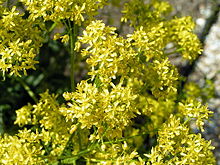Isatis: Difference between revisions
No edit summary |
No edit summary |
||
| Line 32: | Line 32: | ||
Caution: Use with caution in hemorrhagic disorders or with patients on anti-coagulant therapy. |
Caution: Use with caution in hemorrhagic disorders or with patients on anti-coagulant therapy. |
||
It is also an ingredient in Gan mao ling [http://en.wikipedia.org/wiki/Gan_mao_ling] |
|||
[[Category:Brassicaceae]] |
[[Category:Brassicaceae]] |
||
Revision as of 04:43, 30 July 2012
| Isatis | |
|---|---|

| |
| Isatis tinctoria | |
| Scientific classification | |
| Kingdom: | |
| (unranked): | |
| (unranked): | |
| (unranked): | |
| Order: | |
| Family: | |
| Genus: | Isatis |
| Species | |
|
About 30 species, including: | |
Isatis (Í-sa-tis) is a genus of about 30 species of flowering plants in the family Brassicaceae, native to the Mediterranean region east to central Asia. The genus includes woad (Isatis tinctoria).
In China, the root is made into a medicinal tea commonly called Ban Lan Gen (Pinyin).
"It Clears Heat, Expels Toxins, Benefits the Throat, Reduces Swelling, Invigorates the Blood and is used for conditions such as wind-heat, epidemic toxins and seasonal toxic pathogens presenting with swollen, painful, sore throat, ulcerated throat, high fever, mumps, red and swollen eyes and ears, herpes simplex, herpes zoster, abscesses, boils, carbuncles, furuncles."
Ingredients: Radix Isatidix ( Ban lan gen)
Dosage & Usage: Mix the contents of 1 packet in hot water, take as needed.
Caution: Use with caution in hemorrhagic disorders or with patients on anti-coagulant therapy.
It is also an ingredient in Gan mao ling [1]
